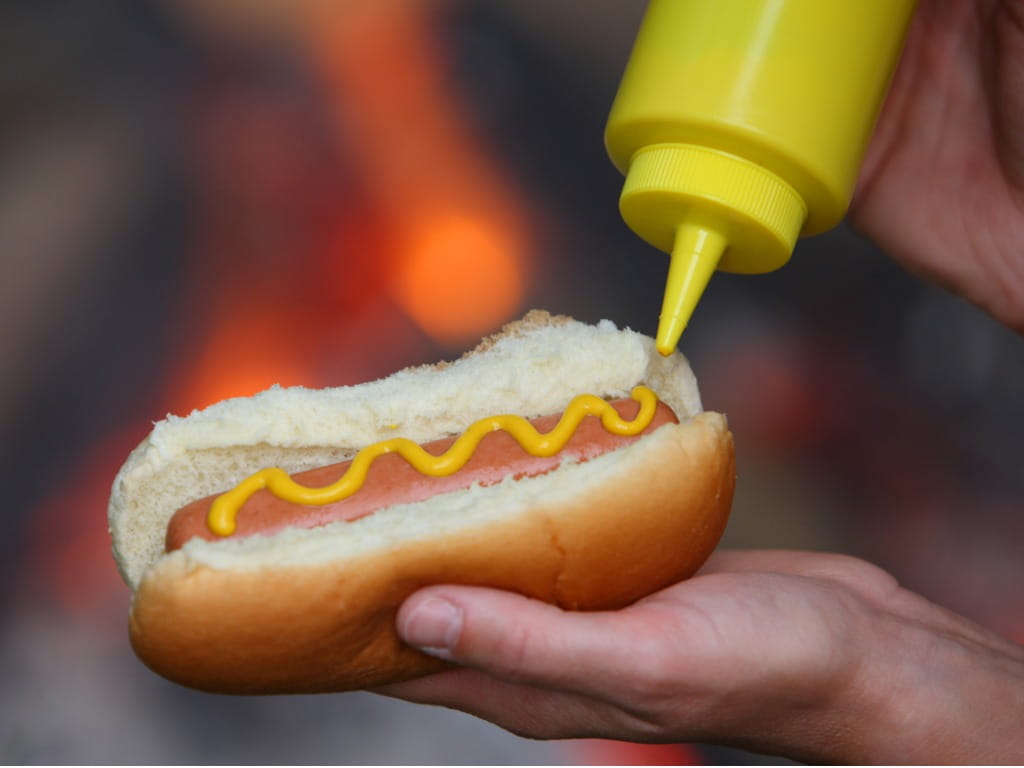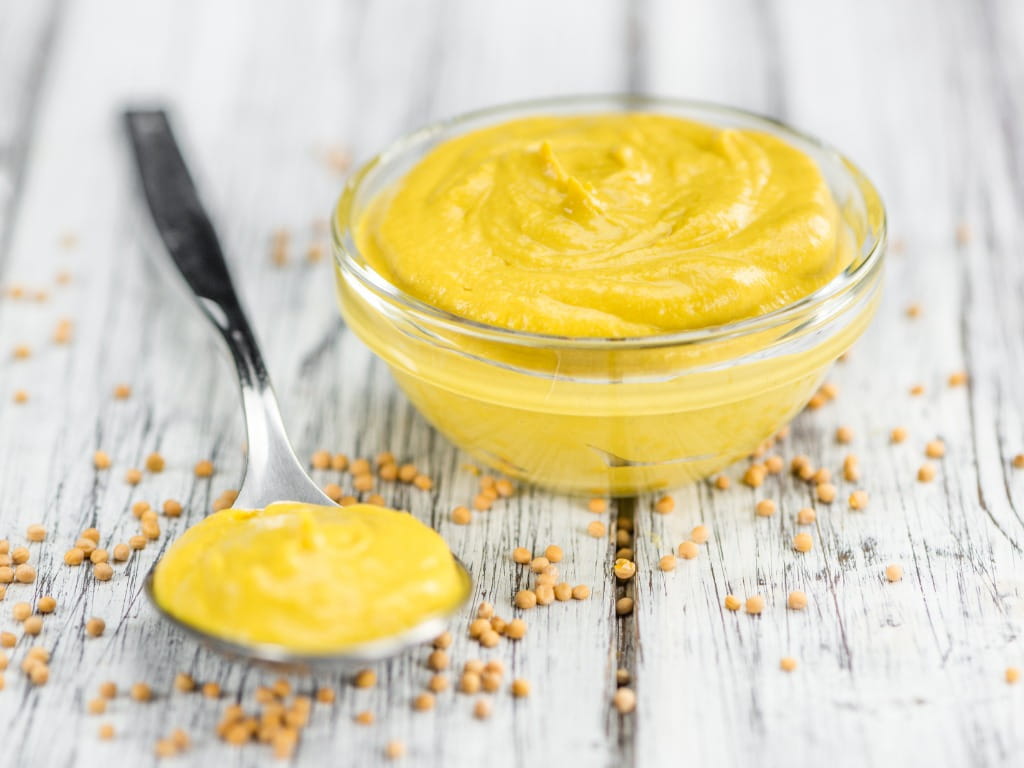Mustard and Mustard Oil Safety

The Bottom Line
Mustard is a popular condiment, but it can cause allergic reactions in some people. Mustard oil is often used for cooking, but only essential mustard oil is approved for use in foods by the FDA.

What is mustard?
Mustard is a flowering plant that has been grown and used as a condiment for thousands of years. The seeds and oil of the plant are recognized for their culinary value. Mustard plant seeds are blended with spices and vinegar to make commercially available mustard products. White mustard seeds are blended with turmeric to form yellow mustard, while Dijon mustard is made from mixtures of black or brown mustard seeds. Mustard’s bitter or pungent taste and aroma are due to the presence of allyl isothiocyanates, chemicals found in other condiments, including horseradish and wasabi.
Historically, mustard was used as a medicinal plant. The Greek philosopher Pythagoras promoted the use of mustard as a treatment for scorpion bites, and the Egyptians placed mustard seeds in the tombs of their kings.
What is mustard oil?
Mustard oil is used as a cooking and salad oil in some Asian countries. There are 2 types of mustard oil. Essential mustard oil is rated as Generally Recognized As Safe (GRAS) by the FDA and is approved for food use. Expressed mustard oil is not permitted in food products by the FDA. The difference between these 2 oils, and the reason for the FDA ban on the expressed oil product, is the presence of erucic acid in expressed mustard oil.What is erucic acid? Is it good for you?
Erucic acid is found in some types of mustard oil and its close cousin, rapeseed oil. In studies performed on laboratory animals in the 1970s, the erucic acid found in rapeseed oil was found to cause heart and kidney diseases. Because of these studies, many countries have prohibited the use of erucic acid in food products. Later trials showed that the harmful effects of erucic acid might be minimal in primates, including humans.
Recent studies suggest that erucic acid might have beneficial activity in humans as an anti-inflammatory agent. Erucic acid, in combination with oleic acid, has been studied as a treatment for a rare genetic disorder called adrenoleukodystrophy. Affected people develop nervous system deterioration that is often fatal within a few years. The 1993 movie Lorenzo’s Oil told the story of a young boy with adrenoleukodystrophy. In the movie, Lorenzo’s family searched for a cure for their son and believed that a combination of erucic and oleic acids could be used to treat the disease. Unfortunately, in real-life clinical trials, erucic and oleic acids did not cure adrenoleukodystrophy, and some who took the mixture developed adverse effects.
Can you be allergic to mustard?
Bakers and restaurant workers have developed finger and hand rashes after handling mustard and radishes (which are part of the mustard family), and testing confirmed the presence of an allergic reaction to the isothiocyanates in the food. Some people have developed severe allergic reactions after eating mustard. In France, mustard is the fourth most common cause of food allergies after milk, eggs, and peanuts. Since mustard is present in many foods, including salad dressings, pickles, and pesto sauce, people who are sensitive to mustard should read food product labels carefully.
If you suspect poisoning from foods or essential oils, get help online at webPOISONCONTROL or call 1-800-222-1222. Both options are free, and available 24 hours a day.
Kelly Johnson-Arbor, MD
Medical Toxicologist
Professor of Pharmacy Emeritus
Poison Control Media Information
Did you find this page helpful? If so, we need your support. Poison Control is in constant competition with misinformation online. Links to www.poison.org or our webPOISONCONTROL triage tool from other websites and blogs help internet searchers quickly find accurate information and Poison Control’s contact information in an emergency. If you use the content from this page, please provide attribution via a link back to this page, www.poison.org, or https://triage.webpoisoncontrol.org/#!/exclusions. By doing so, you could save a life. Thank you!
Poisoned?
Call 1-800-222-1222 or
Prevention Tips
- Do not use expressed mustard oil; it is not approved for use in foods in the US.
- Wash your hands with mild soap and water after handling mustard plants and similar cruciferous vegetables.
- Contact a doctor immediately if you develop rashes, skin redness, wheezing, or difficulty breathing after handling mustard or eating plants that are part of the mustard family, such as radishes, cabbage, or kale.
This Really Happened
Minutes after eating sausage with mustard sauce, a 38-year-old woman developed shortness of breath, chest pain, dizziness, wheezing, and an itchy rash. At a hospital, she was found to have a high heart rate and low blood pressure. She was diagnosed with anaphylaxis (a serious allergic reaction) and treated with intravenous fluids, epinephrine, corticosteroids, and antihistamines. She recovered fully. Allergy testing found a strong response to mustard. She was told to avoid mustard sauce and seeds, read food labels carefully, and use an EpiPen if anaphylaxis occurred in the future (from Pałgan et al., 2018).
For More Information
Sen I. American chefs discover mustard oil. Sikhnet. November 28, 2011. Accessed March 3, 2024.
References
Abdellatif AM. Cardiopathogenic effects of dietary rapeseed oil. Nutr Rev. 1972;30(1):2-6.
Aubourg P, Adamsbaum C, Lavallard-Rousseau MC, et al. A two-year trial of oleic and erucic acids ("Lorenzo's oil") as treatment for adrenomyeloneuropathy. N Engl J Med. 1993;329(11):745-752.
Bell L, Oloyede OO, Lignou S, Wagstaff C, Methven L. Taste and flavor perceptions of glucosinolates, isothiocyanates, and related compounds. Mol Nutr Food Res. 2018;62(18):e1700990.
Import Alert 26-04. US Food and Drug Administration. November 18, 2016. Accessed March 3, 2014.
Lietzow J. Biologically active compounds in mustard seeds: a toxicological perspective. Foods. 2021;10(9):2089.
Mitchell JC, Jordan WP. Allergic contact dermatitis from the radish, Raphanus sativus. Br J Dermatol. 1974;91(2):183-189.
Moser HW, Moser AB, Hollandsworth K, Brereton NH, Raymond GV. "Lorenzo's oil" therapy for X-linked adrenoleukodystrophy: rationale and current assessment of efficacy. J Mol Neurosci. 2007;33(1):105-113.
Poisoned?
Call 1-800-222-1222 or
Prevention Tips
- Do not use expressed mustard oil; it is not approved for use in foods in the US.
- Wash your hands with mild soap and water after handling mustard plants and similar cruciferous vegetables.
- Contact a doctor immediately if you develop rashes, skin redness, wheezing, or difficulty breathing after handling mustard or eating plants that are part of the mustard family, such as radishes, cabbage, or kale.
This Really Happened
Minutes after eating sausage with mustard sauce, a 38-year-old woman developed shortness of breath, chest pain, dizziness, wheezing, and an itchy rash. At a hospital, she was found to have a high heart rate and low blood pressure. She was diagnosed with anaphylaxis (a serious allergic reaction) and treated with intravenous fluids, epinephrine, corticosteroids, and antihistamines. She recovered fully. Allergy testing found a strong response to mustard. She was told to avoid mustard sauce and seeds, read food labels carefully, and use an EpiPen if anaphylaxis occurred in the future (from Pałgan et al., 2018).
